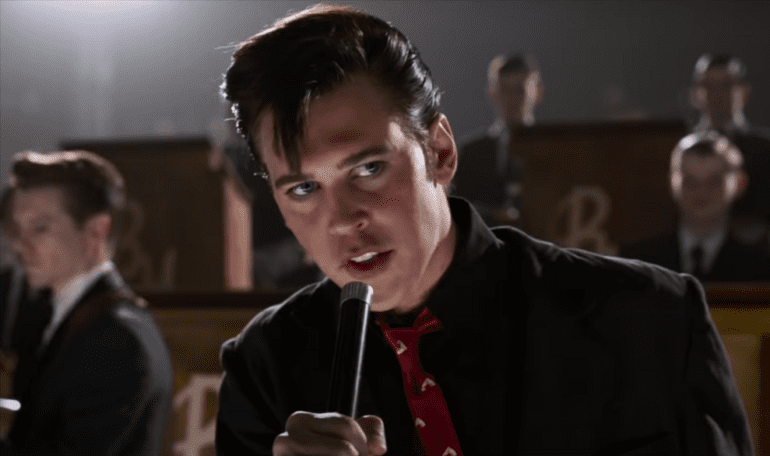Every person, we’re told, has a story. Every life would make a good movie.
Perhaps, but TV and movies keep telling one life-story over and over. That’s Elvis Presley.
The latest example is Baz Luhrmann’s glittery, jittery “Elvis”(shown here) now in theaters. Some critics found it too frenetic, but most approved; with a few reservations, I liked it a lot.
Presley’s life has the classic ingredients of biographical drama – rags to riches, fish out of water, rise-and-fall. It works better than most because the extremes – the rags and riches – are so pronounced.
Luhrmann – the co-writer and director — emphasized that more than most. We see Presley, while his father is in jail, as a penniless kid in an impoverished neighborhood, fascinated by the sounds of the revival tent, the juke joint and the Black church.
That’s apparently no exaggeration. Presley once told an interviewer that “I probably know every religious song ever written.” A member of the Imperials told me about the nights singing with him in Las Vegas, after his shows. “It was always gospel. Only gospel.”
You can sample that every Sunday morning on the Elvis channel of Sirius Radio. The rest of the week covers the full spectrum – great songs (pure rock or powerhouse ballads) one moment, ditsy trifles the next. But at gospel time, the music is magnificent.
Luhrmann captures all of this neatly, perhaps putting too much emphasis on the groin area. I’m told that Presley was simply a jumpy, shaky guy; his whole body was shaking and his groin simply happened to be part of it. The excitement was the overall energy projected by the man and his music.
There are also times when Luhrmann seemed to compact events together for his convenience. Even the great Aaron Sorkin does that (particularly in “Meet the Ricardos”), but it shouldn’t be encouraged.
But Luhrmann (like Sorkin) is a master craftsman; his visuals salvage any excess. His previous films – “Moulin Rouge,” “The Great Gatsby,” “Australia,” the wondrous “Romeo + Juliet” – proved that.
“Moulin Rouge,” incidentally, made the mistake of choosing bland pop songs done by average singers. Not this time. Austin Butler, who is brilliant in the title role, sings the young-Elvis songs himself; as the character ages, the real Presley recordings take over. Both voices are terrific, as (re-creating the Black stars of the past) are Yola, Gary Clark Jr., Alton Mason, Shonka Dukureh and more.
Yes, it was iffy to focus on Colonel Tom Parker. This is a guy (played skillfully by Tom Hanks) who wasn’t really a colonel … or Tom … or Parker … or skilled or honest.
But he was a key part of Presley’s life. He’s why a great talent was given bland songs and bad movies.
He’s not who fans want to see. The TV movie “Elvis and the Colonel” bombed, despite strong work from Beau Bridges.
There have been a couple TV projects simply called “Elvis,” one of them (with Kurt Russell) a big hit. There have been two about Elvis and Richard Nixon, one about Elvis and his wife Priscilla, even one about Linda Thompson, the lover who followed.
Lots of Elvis stories are floating around; we can’t stop re-telling them.
